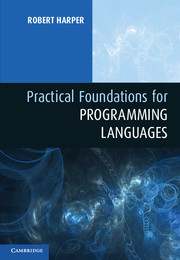Book contents
- Frontmatter
- Contents
- Preface
- Part I Judgments and Rules
- Part II Statics and Dynamics
- Part III Function Types
- Part IV Finite Data Types
- Part V Infinite Data Types
- Part VI Dynamic Types
- 17 The Untyped λ-Calculus
- 18 Dynamic Typing
- 19 Hybrid Typing
- Part VII Variable Types
- Part VIII Subtyping
- Part IX Classes and Methods
- Part X Exceptions and Continuations
- Part XI Types and Propositions
- Part XII Symbols
- Part XIII State
- Part XIV Laziness
- Part XV Parallelism
- Part XVI Concurrency
- Part XVII Modularity
- Part XVIII Equational Reasoning
- Part XIX Appendix
- Bibliography
- Index
18 - Dynamic Typing
from Part VI - Dynamic Types
Published online by Cambridge University Press: 05 February 2013
- Frontmatter
- Contents
- Preface
- Part I Judgments and Rules
- Part II Statics and Dynamics
- Part III Function Types
- Part IV Finite Data Types
- Part V Infinite Data Types
- Part VI Dynamic Types
- 17 The Untyped λ-Calculus
- 18 Dynamic Typing
- 19 Hybrid Typing
- Part VII Variable Types
- Part VIII Subtyping
- Part IX Classes and Methods
- Part X Exceptions and Continuations
- Part XI Types and Propositions
- Part XII Symbols
- Part XIII State
- Part XIV Laziness
- Part XV Parallelism
- Part XVI Concurrency
- Part XVII Modularity
- Part XVIII Equational Reasoning
- Part XIX Appendix
- Bibliography
- Index
Summary
We saw in Chapter 17 that an untyped language may be viewed as a unityped language in which the so-called untyped terms are terms of a distinguished recursive type. In the case of the untyped λ-calculus this recursive type has a particularly simple form, expressing that every term is isomorphic to a function. Consequently, no run-time errors can occur that are due to the misuse of a value—the only elimination form is application, and its first argument can only be a function. This property breaks down once more than one class of value is permitted into the language. For example, if we add natural numbers as a primitive concept to the untyped λ-calculus (rather than defining them via Church encodings), then it is possible to incur a run-time error arising from attempting to apply a number to an argument or to add a function to a number. One school of thought in language design is to turn this vice into a virtue by embracing a model of computation that has multiple classes of value of a single type. Such languages are said to be dynamically typed, in purported opposition to statically typed languages. But the supposed opposition is illusory: Just as the so-called untyped λ-calculus turns out to be unityped, so dynamic languages turn out to be but restricted forms of static language. This remark is so important it bears repeating: Every dynamic language is inherently a static language in which we confine ourselves to a (needlessly) restricted type discipline to ensure safety.
Information
- Type
- Chapter
- Information
- Practical Foundations for Programming Languages , pp. 134 - 141Publisher: Cambridge University PressPrint publication year: 2012
